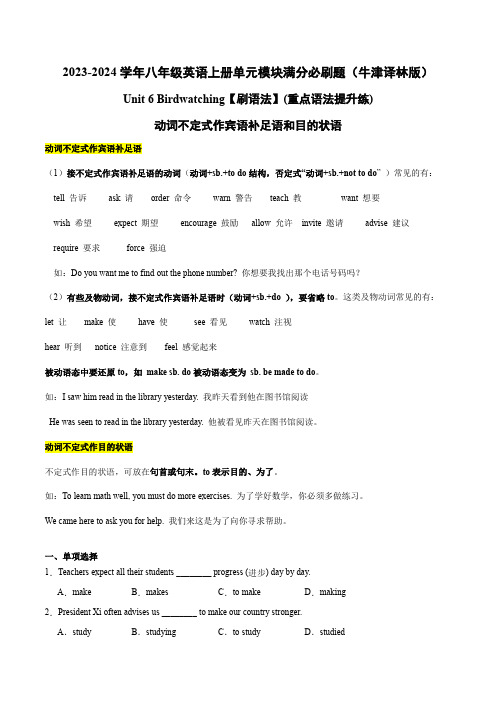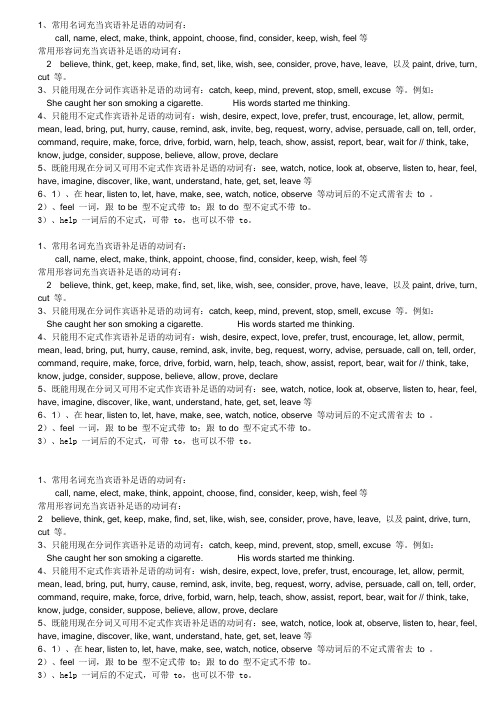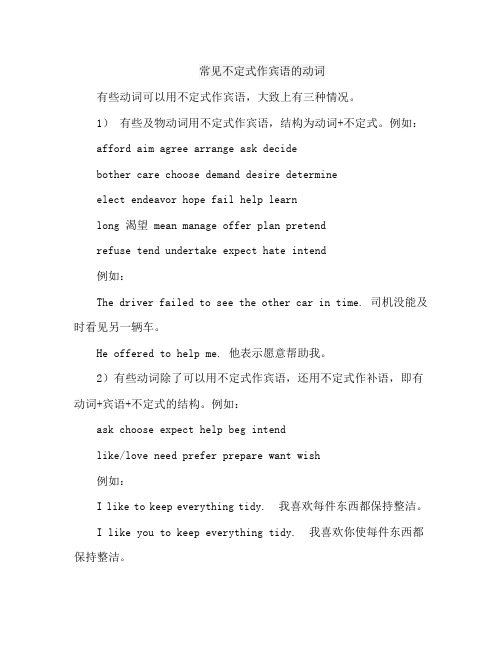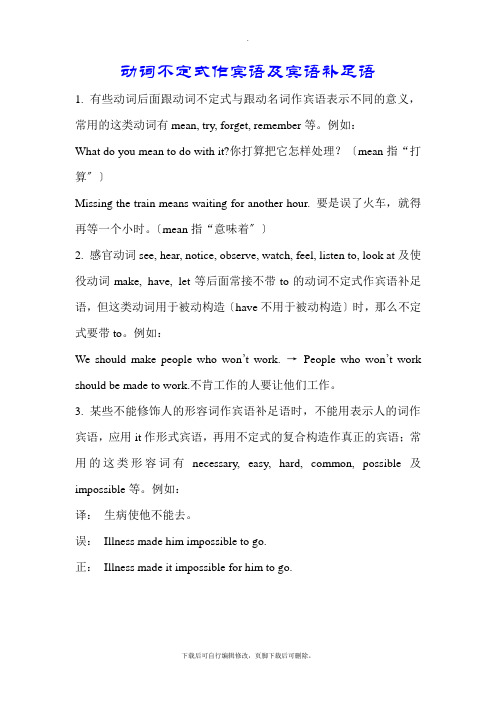可用不定式宾语补足语的动词
Unit6动词不定式作宾语补足语和目的状语-2023-2024学年八年级英语上册(牛津译林版)

2023-2024学年八年级英语上册单元模块满分必刷题(牛津译林版)Unit 6 Birdwatching【刷语法】(重点语法提升练)动词不定式作宾语补足语和目的状语动词不定式作宾语补足语(1)接不定式作宾语补足语的动词(动词+sb.+to do结构,否定式“动词+sb.+not to do” )常见的有:tell 告诉ask 请order 命令warn 警告teach 教want 想要wish 希望expect 期望encourage 鼓励allow 允许invite 邀请advise 建议require 要求force 强迫如:Do you want me to find out the phone number? 你想要我找出那个电话号码吗?(2)有些及物动词,接不定式作宾语补足语时(动词+sb.+do ),要省略to。
这类及物动词常见的有:let 让make 使have 使see 看见watch 注视hear 听到notice 注意到feel 感觉起来被动语态中要还原to,如make sb. do被动语态变为sb. be made to do。
如:I saw him read in the library yesterday. 我昨天看到他在图书馆阅读He was seen to read in the library yesterday. 他被看见昨天在图书馆阅读。
动词不定式作目的状语不定式作目的状语,可放在句首或句末。
to表示目的、为了。
如:To learn math well, you must do more exercises. 为了学好数学,你必须多做练习。
We came here to ask you for help. 我们来这是为了向你寻求帮助。
一、单项选择1.Teachers expect all their students ________ progress (进步) day by day.A.make B.makes C.to make D.making2.President Xi often advises us ________ to make our country stronger.A.study B.studying C.to study D.studied3.—Our English teacher asks us ________ English every day.—So my mother made me ________ the English text for half an hour yesterday evening.A.read; to read B.to read; to read C.to read; read4.There are many rules in Mary’s home. Her parents won’t allow her ________ out late.A.to stay B.staying C.stay D.stayed5.I see Tom ________ English almost every morning.A.reads B.read C.reading D.to read 6.Teachers always encourage their students ________ questions and discuss the answers.A.answer B.answers C.answering D.to answer 7.The workers in the nature park ask visitors not ________ the animals.A.feed B.to feed C.feeding D.fed8.My mother asks me ________ computer games before finishing my homework.A.not play B.to play C.not to play D.to not play 9.Evans had a sore throat (嗓子疼). His friend advised him ________ a doctor.A.seeing B.to see C.see D.sees10.—The doctor advised me ________ too much because it’s not good for my health.—The doctor is right. The less you drink, ________ you will be.A.don’t drink; the healthier B.not to drink; the healthierC.not to drink; the more healthier D.don’t drink; healthier11.Mrs. Smith made her daughter ________ for a long time.A.wait B.waited C.to wait D.waiting12.The old lady loves to watch the kids ________ basketball every evening.A.play B.played C.to play D.plays13.Our teacher tells us ________ in the street. It’s too dangerous.A.not play B.not playing C.not to play D.to not play 14.— Why is Nancy crying?— Because her mother forces her ________ her teeth twice a day.A.brush B.brushing C.to brush D.brushed15.We don’t allow ________ in the classroom, but we allow students ________ in the hallways.A.to sing; to sing B.singing; to sing C.to sing; singing16.I advise you ________ twice before ________ final decision.A.thinking, to make B.to think, make C.thinking, made D.to think, making 17.Lin Tao is hard-working. I often see him ________ English. Yesterday afternoon, when I passed the playground, I saw him ________ soccer.A.read; playing B.reads; played C.to read; play D.be reading; play18.Our teacher often encourages us _______ our dreams no matter what will happen.A.to give up B.not to give up C.not give up D.not giving up19.The teacher advised students ________ to music when doing homework because it would distract (分散) their attention.A.listen B.to listen C.not to listen D.to not listen20.Tom challenged his friend ________ chess.A.play B.playing C.to play D.to playing21.—Can the shelf be finished by the weekend?—Sure. ________ it on time, we will work two more hours a day.A.Completed B.Completing C.To complete D.Complete22.—________ more about tomorrow’s weather in Sheyang, please call 121.—OK, I will. Thank you.A.Know B.Knowing C.To know D.To knowing23.—What way can you think of ________ me improve my listening?—By listening to the tape more.A.helping B.to help C.help24.________ their health, students should exercise more.A.Improve B.To improve C.Improving D.Improved25.Hunters hunt tigers ________ their fur ________ make clothes.A.to; to B.for; to C.to; for D.for; for26.________ the work in time, they need to work two more hours a day.A.To finish B.To be finished C.Finish D.Finishing27.We should do what we can ________ the hunters ________ the animals.A.to prevent; killing B.to prevent; to kill C.prevent; killing D.prevent; to kill 28.healthy, you should eat more vegetables and less fast food.A.Keep B.To keep C.Keeping D.Kept29.—If you need my help, please let me know. I will do anything I can ________ you.—No, thanks. I can do it all by myself.A.to support B.support C.supporting D.supported30.—Wild animals are in danger. They need more people’s help.— Yes. People working in the reserves are doing everything they can ________ them.A.protect B.protecting C.to protect D.to protecting31.________ before training, we all arrive early every time.A.Warm up B.Warming up C.To warm up D.Warmed up32.________ their products more easily, many farmers put them online.A.Sell B.Selling C.To sell D.To selling33.—Peter’s mother gets up early ______ breakfast for him every morning.—Mother’s love is great.A.to make B.making C.make34.President Xi Jinping delivers a New Year address on Saturday evening, Dec 31, 2022, in Beijing ______ 2023.A.welcome B.welcoming C.welcomed D.to welcome35.Susan made some more dumplings ________ her friend a treat during the Spring Festival.A.gives B.giving C.to give D.give36.Shall we go to Lao She Teahouse ________ Beijing Opera?A.to enjoy B.enjoy C.enjoyed D.enjoys37.I’m not good at English. I will work hard ______ it.A.to improve B.improve C.to correct D.correct38.You should practise ______ more in order to ______ your written English.A.to write;improving B.writing;improvingC.writing;improve D.to write;improve39.Last weekend Peter went to the library ________ some books on music.A.borrow B.borrowed C.to borrow D.borrowing40.He ran into the room ________ the girl.A.save B.to save C.saves D.saved二、用所给单词的正确形式填空41.He tried everything (start) the car, but he didn’t make it.42.The doctor did what he could (help) the girl who was badly hurt in the accident. 43.He started a blog (share)his knowledge and connect with like-minded individuals. 44.The teachers send emails (tell) students something on holidays.45.(keep) healthy, you should take more exercise.46.(make) the salad look more colourful, I often mix different fruits together.47.Look! The teenagers are making cards (show) love for their mothers.48.I made a lot of money (help) the poor.49.They decide to do something (protect) the animals.50.All doctors did what they could (save) the people after the earthquake.51.My little son fell in love with chess and often challenged me (play) chess with him. 52.Let’s (glue)these pictures on the big paper.53.Sally invited me (come) to the party, but I forgot it.54.The World Wide Fund for Nature (WWF) chose the panda (be) its symbol. 55.Could you tell my father (call) me when he comes back?56.We often hear some students (practice) speaking English in the English corner. 57.He warns Tom (not make) the same mistake again.58.I would like you (meet) a friend of mine.59.I would like to help people (solve) problems.60.He ordered his men (run) fast.参考答案:1.C【详解】句意:老师们希望所有的学生都能一天比一天进步。
接宾语补足语的动词汇总

接宾语补足语的动词汇总接不定式作宾补的36个常用动词advise sb. to do sth. 建议某人做某事allow sb. to do sth. 允许某人做某事ask sb. to do sth.请(叫)某人做某事bear sb. to do sth.忍受某人做某事beg sb. to do sth. 请求某人做某事cause sb. to do sth. 导致某人做某事命令某人做某事drive sb. to do sth .驱使某人做某事elect sb. to do sth. 选举某人做某事encourage sb. to do sth. 鼓励某人做某事expect sb. to do sth. 期望某人做某事forbid sb. to do sth. 禁止某人做某事force sb. to do sth. 强迫某人做某事get sb. to do sth. 使(要)某人做某事hate sb. to do sth. 讨厌某人做某事help sb. to do sth. 帮助某人做某事intend sb. to do sth. 打算要某人做某事invite sb. to do sth. 邀请某人做某事leave sb. to do sth. 留下某人做某事like sb. to do sth. 喜欢某人做某事mean sb. to do sth. 打算要某人做某事need sb. to do sth. 需要某人做某事oblige sb. to do sth. 迫使某人做某事order sb. to do sth. 命令某人做某事permit sb. to do sth. 允许某人做某事persuade sb. to do sth. 说服某人做某事prefer sb. to do sth. 宁愿某人做某事request sb. to do sth. 要求某人做某事remind sb. to do sth. 提醒某人做某事teach sb. to do sth .教某人做某事tell sb. to do sth. 告诉某人做某事train sb. to do sth. 训练某人做某事trouble sb. to do sth. 麻烦某人做某事want sb. to do sth. 想要某人做某事warn sb. to do sth. 警告某人做某事wish sb. to do sth. 希望某人做某事汉语的“原谅某人做某事”,英语可说成excuse [forgive] sb. for doing sth.。
不定式做宾语、补足语。

不定式做宾语、补足语。
不定式在“主语+谓语+宾语+宾语补足语”句型中充当宾语补足语。
在这一句型中,宾语是动词不定式的逻辑主语。
1.再表示感觉的动词后面作宾语补足语,并且不定式都不带to.这一类动词有:see, hear, feel, watch, notice, observe, look at, listen to,等。
I here them sing yesterday.昨天我听见他们唱歌了。
Did you see him go out?你看见他们出去了吗。
I felt something crawl up my leg.我感到有什么东西爬道我腿上了。
2.在使役动词后作宾语补足语,不定式不带to.这一类动词有:make, let, have等。
转为被动语态时,其后通常都用带to的不定式(have没有被动语态)What would you have me do?你要我做什么?She made him give up smoking.她让他戒烟了。
Let him do whatever he whishes to do.他想干什么就让他干吧。
3.在表示心理状态的动词后作宾语补足语。
这类动词有:consider, think, believe, discover, find, imagine, judge,suppose, prove 等。
这类动词后的不定式通常是“to be+形容词或名词”结构,think,consider,find后的to be常可省略。
We consider him (to be) a good teacher.我们认为他是一个好老师。
He proved that theory (to be) very important.他证明那个理论是很重要的。
I thought her (to be) nice and honest the first time I met her.我第一次见到她的时候就认为她人很好,很诚实。
常见的加宾补的词有哪些

1、常用名词充当宾语补足语的动词有:call, name, elect, make, think, appoint, choose, find, consider, keep, wish, feel等常用形容词充当宾语补足语的动词有:2 believe, think, get, keep, make, find, set, like, wish, see, consider, prove, have, leave, 以及paint, drive, turn, cut 等。
3、只能用现在分词作宾语补足语的动词有:catch, keep, mind, prevent, stop, smell, excuse 等。
例如:She caught her son smoking a cigarette. His words started me thinking.4、只能用不定式作宾语补足语的动词有:wish, desire, expect, love, prefer, trust, encourage, let, allow, permit, mean, lead, bring, put, hurry, cause, remind, ask, invite, beg, request, worry, advise, persuade, call on, tell, order, command, require, make, force, drive, forbid, warn, help, teach, show, assist, report, bear, wait for // think, take, know, judge, consider, suppose, believe, allow, prove, declare5、既能用现在分词又可用不定式作宾语补足语的动词有:see, watch, notice, look at, observe, listen to, hear, feel, have, imagine, discover, like, want, understand, hate, get, set, leave等6、1)、在hear, listen to, let, have, make, see, watch, notice, observe 等动词后的不定式需省去to 。
常见不定式作宾语的动词

常见不定式作宾语的动词有些动词可以用不定式作宾语,大致上有三种情况。
1)有些及物动词用不定式作宾语,结构为动词+不定式。
例如:afford aim agree arrange ask decidebother care choose demand desire determineelect endeavor hope fail help learnlong 渴望 mean manage offer plan pretendrefuse tend undertake expect hate intend例如:The driver failed to see the other car in time. 司机没能及时看见另一辆车。
He offered to help me. 他表示愿意帮助我。
2)有些动词除了可以用不定式作宾语,还用不定式作补语,即有动词+宾语+不定式的结构。
例如:ask choose expect help beg intendlike/love need prefer prepare want wish例如:I like to keep everything tidy. 我喜欢每件东西都保持整洁。
I like you to keep everything tidy. 我喜欢你使每件东西都保持整洁。
I want to speak to Tom. 我想和汤姆谈话。
I want you to speak to Tom. 我想让你和汤姆谈话。
3)有些动词或动词词组可以用动词+疑问词+不定式的结构作宾语。
例如:decide know consider forget learn remembershow, wonder find out tell inquire explain例如:Please show us how to do that. 请演示给我们如何去做。
There are so many kinds of tape-recorders on sale that I can't make up my mind which to buy.。
动词不定式作宾语补足语、目的状语

一.动词不定式作宾语补足语1.because i t allows people to get closer to them. 因为它允许你们更近距离的接触它们。
Allow是动词,people 是宾语to get closer to them 作宾语people的补足语2.the world wide fund for nature chose the panda to be itssymbol. 世界自然基金会选择了大熊猫作为其标志。
Choose----chose 是动词,the panda 是宾语to be its symbol 作宾语补足语3.ask sb to do sth 让某人做某事tell sb to do sth 告诉某人做某事invite sb to do sth 邀请某人做某事help sb to do sth 帮助某人做某事want sb to do sth 想要某人做某事allow sb to do sth 允许某人做某事4.tell sb not do sth 告诉某人不要做某事my teacher tellsus not to make too much noise. 我的老师告诉我们不要弄出太大声音。
My friend invites me to his home. 我的朋友邀请我去他的家里。
5.help/let/make sb do sth 帮助某人做某事/让某人做某事his words makes everyone laugh. 他的话让每个人都笑了she helps me do my homework. 她帮助我做作业二.动词不定式作目的状语:做某事是为了什么.1.the wwf is working hard to save them all. 世界自然基金会正在努力挽救所有的动物。
To save them all 是目的状语2.dylan trained hard to improve his basketball skills. 迪伦刻苦训练一提高自己的篮球技能。
动词不定式作宾语及宾语补足语

.
动词不定式作宾语及宾语补足语
1. 有些动词后面跟动词不定式与跟动名词作宾语表示不同的意义,常用的这类动词有mean, try, forget, remember等。
例如:
What do you mean to do with it?你打算把它怎样处理?〔mean指“打算〞〕
Missing the train means waiting for another hour. 要是误了火车,就得再等一个小时。
〔mean指“意味着〞〕
2. 感官动词see, hear, notice, observe, watch, feel, listen to, look at及使役动词make, have, let等后面常接不带to的动词不定式作宾语补足语,但这类动词用于被动构造〔have不用于被动构造〕时,那么不定式要带to。
例如:
We should make people who won’t work. →People who won’t work should be made to work.不肯工作的人要让他们工作。
3. 某些不能修饰人的形容词作宾语补足语时,不能用表示人的词作宾语,应用it作形式宾语,再用不定式的复合构造作真正的宾语;常用的这类形容词有necessary, easy, hard, common, possible 及impossible等。
例如:
译:生病使他不能去。
误:Illness made him impossible to go.
正:Illness made it impossible for him to go.
下载后可自行编辑修改,页脚下载后可删除。
可用不定式宾语补足语的动词

———————————————————————————————— 作者:
———————————————————————————————— 日期:
ﻩ
用不定式的动词:
一.接不定式:agree, decide, dare, expect, fail, hope, learn, lmanage, plan, pretend, promise, refuse, wish...
二,不定式作宾语补足语的动词有:advise,allow,ask,beg,cause,encourage,expect, force,invite,order, teach,tell,want,warn等。
三,可用不定式宾语补足语,to省略的动词:
在英语中,动词不定式可以作动词的宾语补足语。其中,有11.5个动词在要求不定式作宾补时,要将动词不定式的小品词“to”省略掉,这11.5个动词是:see(看见),watch(观看),look上五个单词都算作“看”字之列);hear(听),listen(听)(以上两个单词属“听”字之列);let(使,让);make(使),have(使,让)(以上三个算作使役动词); feel(感觉),以上共10个动词。最后还有动词help(帮助)作谓语时,其后不定式作宾补可带to,也可以不带to,故它算0.5个动词。这11.5个动词去一个个记住较困难,若采用以下三个口诀中的一种记它们就比较简单了。请看:
2)The boss often made them work long hours.
ﻫ(B)ﻫ
宾补省to有习惯, 只有动词十一个半:
ﻫ“让”“说”“注意”和“帮助”, 两“使”两“听”加“四看”。ﻫﻫ(C)
ﻫ五“看”二“听”一“感觉”, 三个“使役”紧跟着。ﻫﻫ一个“帮助”两均可, 牢记保你不出错!
- 1、下载文档前请自行甄别文档内容的完整性,平台不提供额外的编辑、内容补充、找答案等附加服务。
- 2、"仅部分预览"的文档,不可在线预览部分如存在完整性等问题,可反馈申请退款(可完整预览的文档不适用该条件!)。
- 3、如文档侵犯您的权益,请联系客服反馈,我们会尽快为您处理(人工客服工作时间:9:00-18:30)。
用不定式的动词:一.接不定式: agree, decide, dare, expect, fail, hope, learn, lmanage, plan, pretend, promise, refuse, wish...只跟不定式作宾语的动词速记口诀 :三个希望两答应,两个要求莫拒绝;设法学会做决定,不要假装在选择。
三个希望两答应:hope,wish,want,agree,promise两个要求莫拒绝:demand,ask,refuse设法学会做决定:manage,learn,decide不要假装在选择:petend,choose二,不定式作宾语补足语的动词有:advise,allow,ask,beg,cause,encourage,expect, force,invite,order, teach,tell,want,warn等。
三,可用不定式宾语补足语,to省略的动词:在英语中,动词不定式可以作动词的宾语补足语。
其中,有11.5个动词在要求不定式作宾补时,要将动词不定式的小品词“to”省略掉,这11.5个动词是:see(看见),watch(观看),look at(看,瞧),notice(看,注意),observe(看到,注意到)(以上五个单词都算作“看”字之列);hear(听),listen(听)(以上两个单词属“听”字之列);let(使,让);make(使),have(使,让)(以上三个算作使役动词); feel(感觉),以上共10个动词。
最后还有动词help(帮助)作谓语时,其后不定式作宾补可带to,也可以不带to,故它算0.5个动词。
这11.5个动词去一个个记住较困难,若采用以下三个口诀中的一种记它们就比较简单了。
请看:(A)不定式,作宾补, 11个半动词后省to:hear,see,watch,observe, lookat,feel,notice和listen to;make,have,let和help,通用句型如hear you do。
例:1)I often hear the girl sing in English.2)The boss often made them work long hours.(B)宾补省to有习惯,只有动词十一个半:“让”“说”“注意”和“帮助”,两“使”两“听”加“四看”。
(C)五“看”二“听”一“感觉”,三个“使役”紧跟着。
一个“帮助”两均可,牢记保你不出错!有些动词或短语只接动名词做宾语:allow, consider, enjoy, finish, mind, miss, delay, practice, feel like,can’t help, give up ,keep(on),avoid避开,躲开,stand(忍受), look forward to期待,期望,feel like想要做某事,prevent…from,阻止can't help禁不住,不由自主迫不及待,be/get used to ,be worth doing,be busy doing既可接不定式,又可接动名词的动词:有些动词后接宾语时,既可接不定式,又可接动名词,但有区别。
如1. like to do “喜欢做某事”,指一次性动作。
如 I like to swim in this river now.like doing “喜欢做某事”,指习惯性动作。
如 I like swimming. 类似的还有:dislike to do / doing (“不喜欢做某事”), hate t o do / doing (“讨厌做某事”),love to do / doing (“热爱做某事”),prefer to do / doing (“更喜欢做某事”)。
2. remember to do “记得要去做某事” 如 She remembered to see her parents the next day.remember doing “记得做过某事” 如 I remembered meeting her yesterday.3. forget to do “忘了要去做某事” 如 They always forget to have lunch when they are busy.forget doing “忘了做过某事” 如 I forgot phoning Tom, soI phoned him the second time.4. try to do “试图(尽力)做某事” 如 He tried to catch the early bus and he got on it at last.try doing “试图(试着)做某事” 如 I tried getting on well with the new students.5. mean to do “打算做某事” 如 Jack meant to help others.mean doing “意味着做某事” 如 Drinking means wasting your life.6. need to do “需要做某事” (主语必须是人) 如 We need to havea rest.need doing “需要做某事”(主语必须是物) 如 The bike needs mending. ( = The bike needs to be mended)7. want to do “想要做某事” (主语必须是人) 如 We want to havea rest.want doing “想要做某事”(主语必须是物) 如 The bike wants mending. ( = The bike wants to be mended)8. begin to do与begin doing 都译作“开始做某事”,二者可以混用。
但是begin doing更强调动作不但开始,而且一直持续下去。
如 The baby began crying hard.而在下类情况下只用begin to do, 不用begin doing:○1当主语是物时。
如 It began to snow.○2当begin用进行时的时候。
如 The train is beginning to leave. ○3当begin后接表示心理活动的动词(如think, understand, know)时。
如 She began to understand her parents.注:begin的用法完全适用于start。
9. go on to do “继续做某事”,指做不同的事。
如 After reading English, she went on to learn math.go on doing “继续做某事”,指做同一件事,相当于_go on with sth 。
如 When I was writing a letter, someone knocked at the door.I opened the door and then went on writing t he letter (= …went on with the letter).10. continue to do “继续做某事”,指做不同的事。
如 After reading English, she continued to learn math.continue doing “继续做某事”,指做同一件事。
如 When I was writing a letter, someone knocked the door. Iopened the door and then continued writing the letter.11. be used to do “被用来做某事” 如 Dictionaries are used to look up words.be used to doing “习惯于做某事” 如 He is used to exercising in the morning.12.try 后接不定式表示设法去做某事,接动名词表示做某事试试(看有何效果)。
如:Try to be serious for a moment.设法正经一会儿。
Try phoning his home number.给他家里打个电话试试。
13.stop to do sth表示停下做另一件事,stop doing sth表示停止正在做的事Ⅰ. 单项选择( ) 1. — Would you like to have dinner with me?— Sorry, I have a lot of housework .A. to doB. doneC. doD. to be done( ) 2. — I tried to make Kate her mind, but I found it hard.— Well, I saw you that when I went past.A. changes; doB. changes; doingC. to change; doD. change; doing( ) 3. — Oh, I had a terrible toothache.— You’d better see a doctor and have your bad teeth out.A. go to; pullingB. to go to; pulledC. go to; pulledD. to go to; pulling( ) 4. — Mr Wang, I have trouble the text. —Remember it three times before you begin to understand it.A. to understand; readingB. understanding; readingC. understanding; to readD. to understand; to read( ) 5. Don’t worry. We will do anything we can you.A. helpB. to helpC. be helpedD. helped( ) 6. — Did you let anyone the flowers?— Yes, I had the flowers .A. to water; waterB. to water; wateredC. water; to be wateredD. water; watered( ) 7. Would you mind me a favour?A. doB. to doC. doingD. did( ) 8. — Why not the Music Club?—Sorry, I can’t sing or dance.A. to joinB. joinC. joiningD. join in( ) 9. No matter how hard it is, we’ll keep until wemake it.A. failedB. failingC. triedD. trying( )10. What happened to the boy? He tried my questions.A. to avoid answeringB. avoiding answeringC. to avoid to answerD. avoiding to answer( )11. We couldn’t help when Uncle Wang told us the news.A. laughB. laughedC. laughingD. to laugh( )12. — What should I do, doctor?— healthy, you should take more exercise.A. KeepB. KeepingC. To keepD. Having kept( ) 13. It took my daughter two weeks the novels by Liu Yong.A. read; writtenB. to read; writtenC. reading; to writeD. to read; wrote( )14. — Will you please show me how to do the role-play exercise?— Sure. Now let me tell you first.A. which to doB. how to doC. when to doD. what to do( )15. When class begins, we stop to the teacher carefully.A. listeningB. to listenC. listensD. listenⅡ. 用括号内所给单词的适当形式填空。
